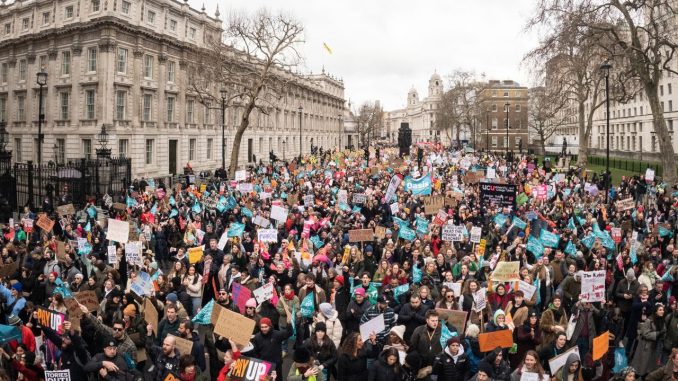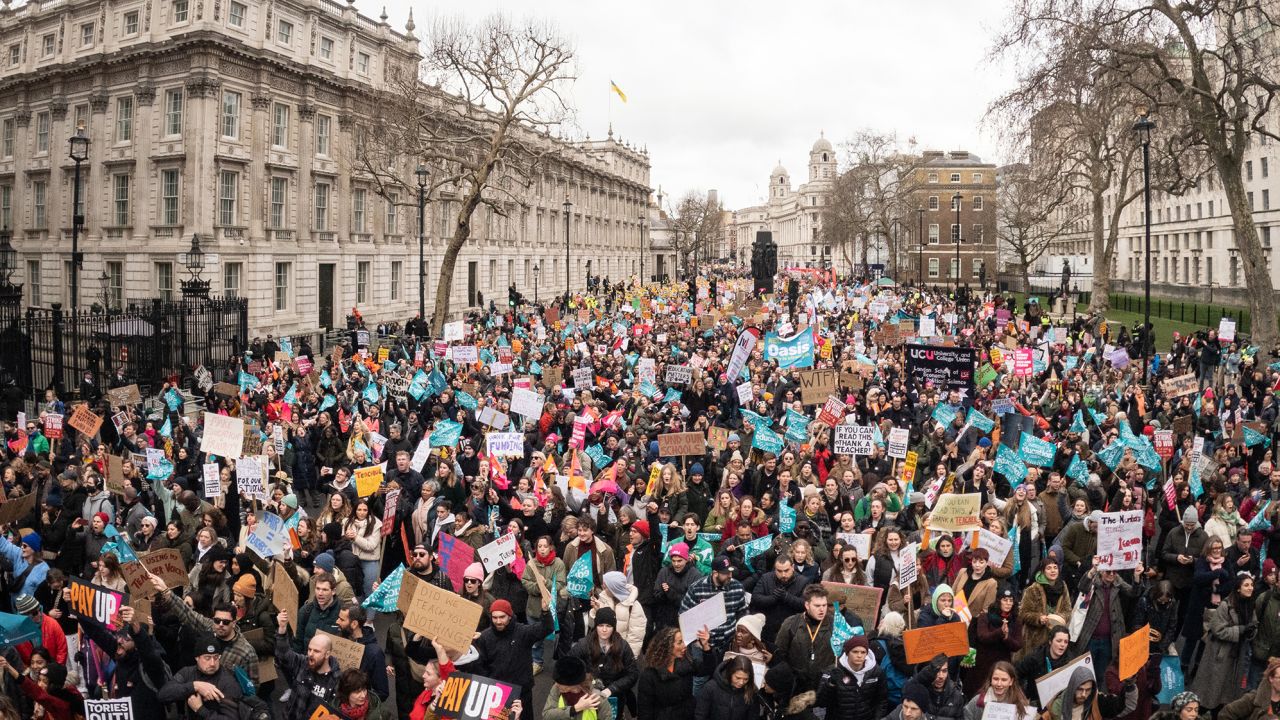
by Ralph Keller
On February 1, workers in the UK’s public services—teachers, civil servants, border force staff, rail workers, and members of the University and College Union (UCU)–brought on the biggest strike in recent memory. 500,000 workers are taking part across the UK. Yet on February 17, the leadership of the UCU unilaterally called a two-week “pause” in the strikes, giving as a reason “significant progress” in the ongoing negotiation with employers. There has, however, been little progress at all.
Those who are participating in the strikes, who are on the picket lines, and who are sacrificing their pay, are baffled, bewildered, angry and outraged by this “pause” that they did not authorize. It was imposed by the union leadership without the membership’s approval.
February 1 strike day protest at Whitehall, London. Credit: CNN.
For UCU members, February 1 was the first day in a series of strikes intended to force employers to make concessions in the Four Fights Dispute, previously covered in With Sober Senses. The dispute concerns fair pay, a stop to casualisation, reinstating manageable workloads, and equal treatment irrespective of gender, race and age.
Ordinary union members now fear that the pause plays into the hands of the employers because, contrary to the claim by the UCU bosses, no substantial progress has been made in the negotiations, and all “offers” by the employers remain vague and non-committal. There are serious worries among UCU members that the Four Fights Dispute will be sold out and their hardships will have been for nought.
Employers could not care less whether UCU calls a pause; all that employers are concerned about is that normal business be resumed so that the pressure is off them. There is a now a real possibility that employers will discipline UCU members through the union bosses. This wouldn’t be without precedence. For example, anecdotal evidence tells us that British Airways strikes in the past had built up such a momentum that airline bosses were shaken. And then the airline union’s chief negotiator allegedly asked the bosses, “what do you need from me?”
Teachers Form Self-Help Groups; Ask Who Needs Union Bosses?
Some UCU members had not been preparing for their classes because strikes had been planned throughout March. Suddenly they were being forced to work frantically, right before the pause took effect, to prepare for the next two weeks.
A grassroots support group was formed in which members share their teaching materials. This is an example of self-organising in response to union bosses unilaterally calling a pause on the strikes. And there is more self-organising, i.e., a call to protest outside UCU headquarters. A protest held Feb. 1 in downtown London was huge.
Unfortunately, having to fight their union bosses is nothing new to ordinary UCU members. They have had to protest outside headquarters in the past. The question therefore becomes: who needs union bosses? who needs a labour hierarchy? If ordinary members were to draw on theory and incorporate it into their efforts at self-organisation, then I believe that the struggle would be much more effective. This is because union bosses make unilateral calls that are worse than undemocratic; they make unions vulnerable to capture and manipulation by employers. Moreover, making unilateral calls is dictating union members’ lives, an expression of unfreedom.
In contrast, grassroots action guided by theory is the road to freedom, because ideas and theory are not easily manipulated and captured by individual interests and agendas. For all these reasons, the strikes should not have been “paused” by the union bosses.



Be the first to comment